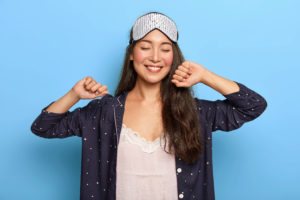
THE BOTTOM LINE
- Supplement with the basics like magnesium to cover any deficiencies
- Level up with supplements like valerian root or chamomile to chill out
- Go advanced and build yourself a sleep stack with compounds like GABA and L-Theanine
A lot of people turn to sleep aids to help whisk them off to dreamland. Unfortunately, many of the popular pharmaceutical options have a high risk of addiction and can also reduce the quality of sleep you get. Natural herb supplements can be a great way to reduce stress and increase your restorative sleep. While sleep aids aren’t a cure-all for sleep, adding them to your routine can make a big difference!
Don’t be afraid to be basic! It’s always best to start with the basics when supplementing and build up from there
THE NITTY GRITTY BASIC SUPPLEMENTS
Many sleep issues are caused by deficiencies in certain vitamins and minerals. Consequently, these commonly used supplements can be used to cover the basics and help your slumber.
VITAMIN D
Most studies find that over 40% of us are deficient in the sunshine vitamin. Low levels of vitamin D are associated with poorer quality sleep, reduced sleep duration, and a higher risk of sleep disorders. Luckily, daily supplementation with vitamin D can improve the quality and quantity of sleep!
You can get your vitamin D through good old-fashioned sunshine, foods like oily fish or egg yolks, or in supplement form. For most people, taking a supplement is a great way to get your levels up and reap all the health benefits.
- Dose: Start out at 600 to 800 IU daily
MULTIVITAMIN
Longer sleep duration has been associated with daily multivitamin use. Most multivitamins cover your recommended intake for a variety of vitamins and minerals that can help sleep. Additionally, getting enough B vitamins is important for melatonin production, and vitamin E can help with nights sweats and restless leg syndrome.
MAGNESIUM GLYCINATE
Every cell in your body needs magnesium to function and around 50% of people don’t get enough magnesium in their diets. Due to this magnesium deficiency, insomnia, restless sleep, frequent waking, and increased stress and anxiety can ensue.
Since it activates the parasympathetic nervous system (the system responsible for calming you down), you can significantly induce relaxation by supplementing with magnesium. Additionally, magnesium works by binding to GABA, the calming neurotransmitter, which also results in a relaxation effect. However, magnesium can be known to have a laxative effect so try taking magnesium glycinate instead; it is a rapidly absorbed version that’s less likely to have any laxative effect.
- Dose: Try 500 to 800 mg daily
IRON
Nearly 25% of the world’s population and nearly half of all pregnant women (growing babies are greedy for iron) suffer from iron deficiencies.
Anemia is the resulting condition from too little iron and it can be disruptive to sleep. Furthermore, it can increase anxiety and episodes of restless leg syndrome. Have your levels checked and supplement as needed to improve your sleep.
OMEGA-3
The majority of American adults don’t get their recommended intake of omega-3. In addition to this, low levels of Omega-3 are associated with sleep problems and even sleep apnea.
Supplementing with Omega-3 has a plethora of health benefits including reducing inflammation and improving quality of sleep. Get your fix by regularly eating oily fish like salmon or choose a high-quality supplement with at least 500 mg of EPA and DHA.
What about melatonin?
Melatonin is one of the most popular sleep aids on the market. What’s great is your pineal gland actually produces it naturally! It’s key job is to let your body know when it’s time to fall asleep and when it’s time to wake up.
However, it is frequently overused which reduces its effectiveness
Melatonin supplements have been found to improve onset, duration, and quality of sleep in people with sleep disorders. It may also be helpful in shift workers who are at a higher risk of sleep problems. So, short-term use of melatonin is safe but experts warn that long-term use of melatonin may reduce your natural production.
Dose: Stick with a lower dose between 0.5 to 1.5 mg before bedtime and up to 5mg if treating insomnia or jet lag.

NEXT LEVEL SUPPLEMENTS
If you’ve got the basics covered you may be interested in taking it up a notch. These supplements have a decent amount of research backing them as good anxiety-reducing and sleep-promoting compounds.
VALERIAN ROOT
You may or may not have heard of it, but valerian root is one of the most researched natural sleep aids on the market. It appears to work its magic through its action on GABA, the neurotransmitter that calms your brain cells and contains antioxidants that have sedative and sleep-enhancing properties.
On its own, valerian root has been shown to be effective at treating insomnia but it seems to work even better when combined with herbs like hops. A combination of valerian root and hops was shown in several studies to improve sleep latency (the time it takes to fall asleep) and sleep quality.
Valerian root may also improve your body’s reaction to stress by limiting activity in the area of your brain responsible for fear and emotional stress responses. Furthermore, it can help you fall asleep more quickly and reduce your body’s response to stress.
- Dose: 300 to 600 mg 30 minutes to two hours before bedtime
HOPS FLOWER
Lovers of beer, you may already think of hops as a good friend. You may be surprised, however, to learn that this flavourful little plant is also a great sleep supplement. Hops has natural sedative effects that can increase sleep time, especially when combined with valerian root. Additionally, investigation into the sleep-inducing effects of hops has found that it reduces body temperature which is an important physiological step toward sleep.
- Dose: 300 to 500 mg on its own, or 40 to 60 mg when combined with valerian root
CHAMOMILE LEAF
If you’ve ever purchased tea you’ve likely come across some version of calming chamomile tea. Chamomile leaf is associated with “calming” because it contains active ingredients such as the antioxidant apigenin. Apigenin is neuroprotective and binds to benzodiazepine receptors in the brain which results in a sedative effect.
Chamomile supplements can reduce anxiety and improve sleep quality. Tea time is optional because chamomile is readily available in supplement form!
- Dose: 220 to 1,600 mg daily

ADVANCED LEVEL STUFF
You have the basics, you climbed the next level, and now you’re ready to reach the top. We hear you loud and clear and we want to help you sleep.
Want to build a sleep stack?
Combining L-Theanine with GABA helps you fall asleep more quickly in improves the quality of your deep sleep*
L-THEANINE
This relaxation-promoting amino acid can be found in tea leaves. It has been found to be calming and even reduce your resting heart rate. Furthermore, it improves sleep quality and reduces the time it takes to fall asleep. On top of that, it works synergistically with GABA so you can try combining them for an awesome sleep stack.
- Dose: 250 to 500 mg
GAMMA-AMINOBUTYRIC ACID (GABA)
GABA has a calming effect on the brain and can reduce feelings of anxiety, fear, and stress response. Low GABA is linked to insomnia and disrupted sleep. Therefore, supplementing with GABA can help improve mood, reduce anxiety, and help you fall asleep faster and get more REM sleep.
- Dose: 500 to 1,000 mg before bed (use alone or make a super stack with L-Theanine*)
*Note: There is no official guideline for a GABA/L-theanine stack but researchers found that the best ratio was 100 mg/kg of GABA combined with 20 mg/kg of L-Theanine
Sleep aids should promote brain health, not harm it
CANNABIDIOL (CBD)
It has been making waves in the natural supplement scene for its many health benefits. CBD helps induce relaxation, reduces anxiety and stress, and it is neuroprotective. Plus, it does all of this without getting you “high”. What’s even cooler, one study using 300 mg of CBD for sleep found that CBD improves sleep without interrupting sleep cycles.
Try buying a full-spectrum oil to benefit from the “entourage effect” created by the multiple health compounds in hemp plants. Also, choose a reputable brand that offers third-party testing to ensure quality and accuracy in dosing.
- Dose: CBD oil 30 to 100 mg (start low to find sweet spot)
L-TRYPTOPHAN
This amino acid can be found in many food sources and has become a very popular supplement to support mood and sleep. It’s also the compound responsible for the nap you need after binging on turkey. On top of that, your body uses tryptophan to make serotonin and melatonin, important chemicals for sleep.
L-Tryptophan supplements have been shown to improve sleep quality, reduce the time it takes to fall asleep, and been demonstrated to be especially effective in people with mild insomnia.
- Dose: 1 to 6 grams
5-HTP
Tryptophan is converted into 5-HTP, so their benefits are similar. 5-HTP is more potent since it directly crosses the blood-brain barrier and is quickly converted into serotonin. This makes it more effective at boosting serotonin but also a little riskier than L-tryptophan because it can potentially cause the depletion of other neurotransmitters.
There is some work suggesting 5-HTP may be neurotoxic. Therefore, it’s probably best to stick with 5-HTP’s gentle cousin tryptophan and reserve any 5-HTP use for special occasions (i.e. jet lag).
- Dose: 200 to 300 mg
Have you tried everything and feel desperate for sleep?
Try a stack of CBD/L-Theanine/GABA
GLYCINE
This amino acid and neurotransmitter is important for skin, muscles, brain health, and sleep. Your body temperature lowers when taken before bed, which helps improve your progression into sleep. Additionally, it has also been shown to improve sleep quality, reduce daytime sleepiness, and elevate serotonin levels.
- Dose: 3 to 5 g (taken orally before bed)
MAGNOLIA BARK
Commonly used in Chinese medicine, two compounds of magnolia bark (honokiol and magnolol) have been found to have potent antioxidant and anti-inflammatory properties and may help with sleep. One of the reasons magnolia bark seems to improve sleep is due to its ability to activate cannabinoid receptors, which help regulate sleep.
Fun fact: Magnolia bark is a great alternative to CBD!
- Dose: 200 to 400 mg (Most studies use 2.3 to 0.9 mg/pound or 5 to 25 mg per kg)
BAICALIN
Baicalin is an active compound taken from the root of a flowering plant called the Chinese Skullcap. It is used to treat inflammation, blood pressure, and insomnia. Its calming effects appear to be due to its interaction with the GABA system. Also, research has found it may also increase slow-wave and REM sleep during the night, which can boost the restorative mechanism of sleep.
- Dose: 200 to 500 mg






